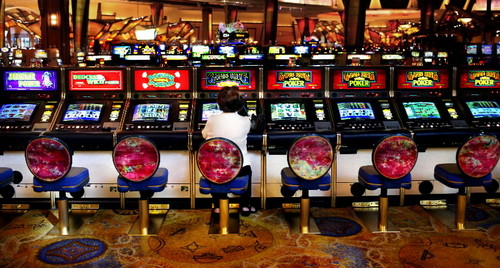
Charles Duhigg talks about it in his new book, The Power of Habit: Why We Do What We Do In Life and Business. Pop-psychologist-writer Jonah Lehrer, author of Imagine, co-editor of Wired magazine, talks about it. Act Three of one most recent This American Life episode about stories from casinos, called “Blackjack,” hits on it, too. It’s called the Near-Miss Effect and, as Lehrer says, it basically means that, “from the perspective of our dopamine neurons, near misses are virtually indistinguishable from actual wins. Both forms of feedback tickle our reward circuitry, which is why Vegas invests in games and algorithms that are full of close calls.”
Both Duhigg and This American Life correspondent Sarah Koenig (in Act 3 of that episode, called “Harrah’s Today, Gone Tomorrow,” you can listen to it here), tell the story of one Angie Bachmann, a woman who became a gambling addict and was finally brought into suit by the casino for the amount of debt she had accrued, which was reaching the millions of dollars. Absurdly, Bachmann is suing the casino for continuing to put her in the line of fire, despite her propensity towards coming back. The episode has a great perspective on the heart of addiction, namely, the lack of control one has to master one’s environment (particularly when diamond gifts and trips to Tahoe are given in response to your addictive losses). Bachmann lost more and more money and, as casinos are wont to do, she was rewarded for her losses. Losing felt like winning, in the wrong kind of way. Here’s TAL correspondent Sarah Koenig talking to a couple neuroscientists:
Reza Habib: In pathological gamblers, the same regions that are activated for wins are also activated for near misses. And so these include regions such as the amygdala, which is a region involved in emotional processing, as well as parts of the brain stem which are involved in reward and dopamine function, which is part of the reward system. So the pathological gamblers, their brains, at least, are responding to these near misses in the same way that they respond to wins.
Mark Dixon: And one of the effects of this, or the implications of these data, are that a pathological gambler going into the casino who’s actually losing, his brain is firing like he’s winning. Disturbing, isn’t it.
Sarah Koenig: Yeah. It’s crazy.
Mark Dixon: Oh, it’s way crazy. And so you are experiencing those same sensations as a win when you’re not winning.
So for Bachmann, her losses were not losses, they were near-misses, and that made all the difference in the way her wiring failed her. Call it the reward center of the brain, chalk it up to a self-justifying node of the addictive personality–basically, she wants to be a winner so badly that she becomes blind to the self-destructive path she’s chosen to get there, and she won’t even get there. It’s not just a Vegas phenomenon, either. Think about the three-point shooter gone cold, who keeps shooting, waiting for that shot that’s going to put him back in rhythm. Think about the sexual addict, the body image standards for those with eating disorders. Think about the Traveling Experience-Seeker, or the accolade spinster, the profile maker. It’s “maladaptive circuitry”–a wiring towards loving the things which will kill us. When we see our zeroes as ones, and the basket seems to be filling, it still isn’t–the zeroes are zeroes.
And maybe here we find the possibility of hearing some good news, that at the bottom of this pursuit, when we’ve pulled the lever for the last time, and two out of three cherries have lined up–we’ll have nothing left to spin again with. And hopefully with no more credit in the casino, we’ll have nothing left to do but quit the game altogether and walk off, with nothing left to play with (as below).
[youtube=http://www.youtube.com/watch?v=n73fHnz6kMk&w=550]
[youtube=http://www.youtube.com/watch?v=RCkJ60bEHxc&w=550]

COMMENTS
2 responses to “Having Another, the Maladaptive Habit of Near-Missing”
Leave a Reply














Great comments, but your reference to the three point shooter who keeps waiting for one to fall is actually in a separate category. (Assuming that the player has a rational evaluation of his or her own talent), that’s *exactly* what the shooter needs to do and it’s why coaches often praise the great shooter as having “no conscience.” It is not reckless, rather, it is necessary, because some shots will always miss, and you cannot be paralyzed by that. Pecca fortier, as it were. Interestingly, another Mockingbird-friendly point is made here, that we lost sinners, now found, must live with a certain freedom from fear. How to distinguish sneaky seductions to addiction from opportunities to “press on” may be one of our more difficult challenges.
Pecca fortier, indeed. Great point on free, no-conscience shooting, thank you for that William. There is a distinct difference between patience/endurance and addictive recidivism–any ideas on how to make that categorical distinction? Is it foundational hope, what the repeated actions are rooted in?